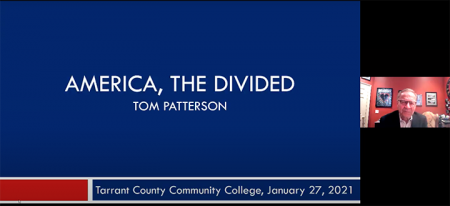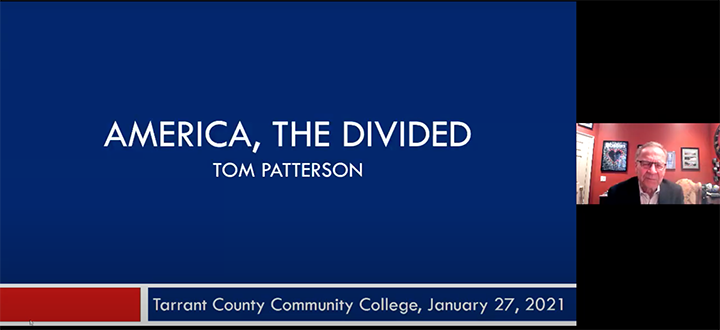LOGAN EVANS
campus editor/photographer

on misinformation in the news and the government.
The common ground between political leaders on both sides of the aisle has completely eroded over the last 50 years, says Thomas Patterson of Harvard’s Kennedy School of Government.
Patterson detailed this erosion and more in a Jan. 27 lecture to TCC students and staff.
The virtual lecture was titled “America, the Divided,” but it began with a display of likeness — a collage of words President Joseph Biden and former President Donald Trump said during each of their inaugural addresses, which illustrated a lot of overlap.
“Now, those are very different speeches,” Patterson said. “But I think if you plugged in the speeches of Lincoln, Reagan and Roosevelt, you’d find many of the same words.”
Patterson said that despite this, polarization is worse than ever. A Pew Research Center poll featured in the lecture found that 70% of Democrats think of Republicans as closedminded, while 70% of Republicans think of Democrats as such.
Patterson believes that rampant misinformation is to blame.
Citing media coverage of the voter fraud claims that spurred the insurrection at the Capitol, he said that reporting on false information, even just to to label it as false, can still lead to that misinformation spreading.
“People tend to remember the claim, but not the fact that it was judged to be inaccurate,” Patterson said. “It still gets nestled into their mind as fact.”
This is especially true when confirmation bias — the tendency to interpret evidence based on preconceived beliefs — comes into play, Patterson explained. He believes that partisan media can chain viewers to a single point of view.
“We don’t detect misinformation very easily when it’s on our side,” he said. “ When we hear something about how bad the other party is, we’re likely to believe it.
Patterson has a history of speaking out against the negative ways he believes mainstream news can impact the political process. In 1993, he received the American Political Science Association’s Graber Award for his book “Out of Order,” a critique on the media’s “domination” of politics. Many ideas explored in his book came up in his presentation.
“Dr. Patterson touched on a lot of topics that I feel are very important in the political landscape currently,” NE student Derek Kendall said. “With so much false information available to use, it’s crucial that we can make informed decisions about what’s presented to us.”
NE assistant government professor Christopher Douglas moderated the lecture. He believes that students should take the extra time to consume political news from multiple sources, including from public figures directly. “Various points of view can be more insightful than just relying on the same messenger,” Douglas said.
After his lecture, Patterson opened the floor to questions from the audience. A student asked how members of the media should ethically cover misleading info from elected officials.
“They’ve go about them,” he replied.

